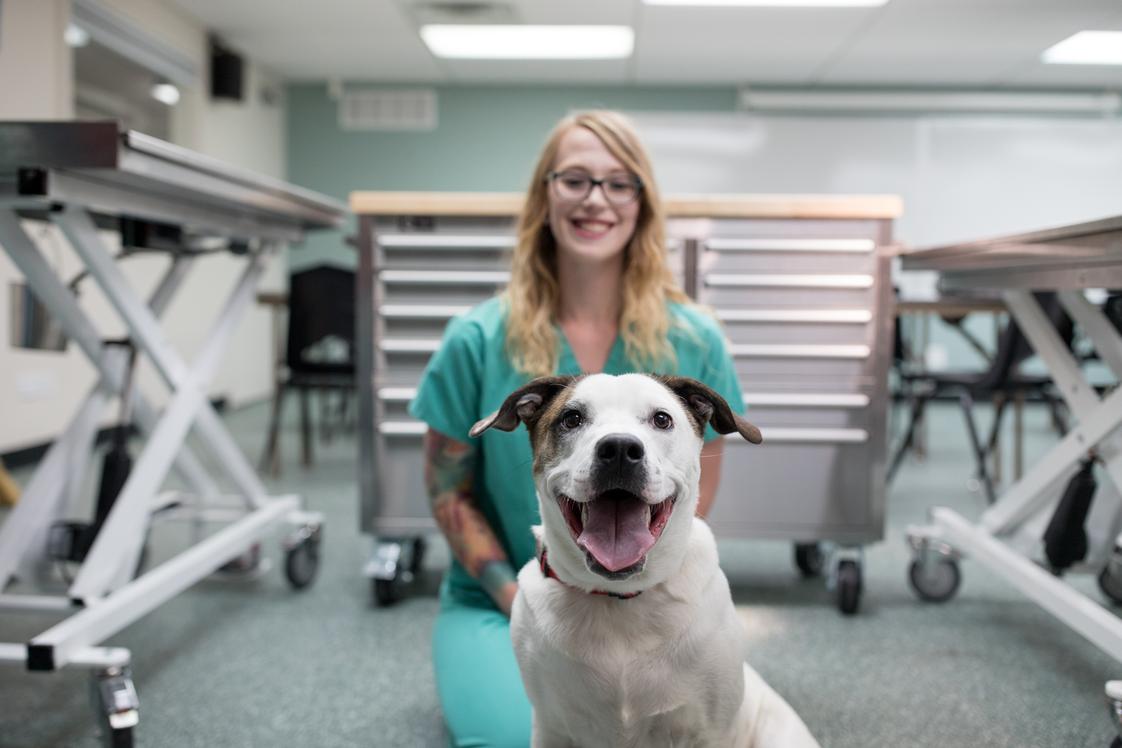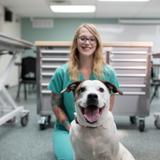- Located at base of the Rocky Mountains in beautiful Colorado, Bel-Rea Institute of Animal Technology is one of the largest veterinary technician schools in the United States.
School Highlights
Bel-Rea Institute Of Animal Technology serves 265 students (100% of students are full-time).
The college's student-teacher ratio of 8:1 is lower than the state community college average of 23:1.
Minority enrollment is 60% of the student body (majority Hispanic), which is more than the state average of 51%.
Quick Facts (2026)
- Enrollment: 265 students
- In-state tuition: $32,900
- Out-state tuition: $32,900
- Acceptance Rate: 81%
- Student-teacher ratio: 8:1
- Minority enrollment: 60%
- Source: Verified school update
Top Rankings
Bel-Rea Institute Of Animal Technology ranks among the top 20% of public schools in Colorado for:
Category
Attribute
Diversity
School Overview
The teacher population of 35 teachers has stayed relatively flat over five years.
Bel-Rea Institute Of Animal Technology
(CO) Community College Avg.
Carnegie Classification
Special Focus Two-Year: Health Professions
Baccalaureate/Associate's Colleges: Mixed Baccalaureate/Associate's
Institution Level
Less than 2 yrs
At least 2 but less than 4 years
Institution Control
Public
Private, non-profit
Total Faculty
35 staff
92 staff
School Calendar
Student Body
The student population of Bel-Rea Institute Of Animal Technology has declined by 13% over five years.
The student-teacher ratio of 8:1 has decreased from 41:1 over five years.
The Bel-Rea Institute Of Animal Technology diversity score of 0.74 is more than the state average of 0.69. The school's diversity has grown by 67% over five years.
Total Enrollment
265 students
2,252 students
Student-Teacher Ratio
8:1
23:1
# Full-Time Students
265 students
743 students
# Part-Time Students
n/a
1,509 students
# Enrollment Undergraduate
265 students
185 students
# Full-Time Undergraduate Students
265 students
536 students
# Full-Time Graduate Students
n/a
95 students
# Part-Time Undergraduate Students
n/a
1,509 students
Total Dormitory Capacity
n/a
307 students
% American Indian/Alaskan
n/a
1%
% Asian
1%
6%
% Hispanic
19%
25%
% Black
3%
6%
% White
40%
49%
% Hawaiian
20%
3%
% Two or more races
6%
4%
% Non Resident races
n/a
2%
% Unknown races
11%
4%
Diversity Score
0.74
0.69
College Completion Rate (Students who graduate in less than 4 years)
58%
64%
College Completion Rate (Students who graduate in 4 years or more than 4 years)
n/a
27%
Average Graduate Earnings (10 Years)
$29,900
$33,300
Tuition and Acceptance Rate
The public in-state tuition of $32,900 is more than the state average of $3,735. The in-state tuition has grown by 166% over four years.
The public out-state tuition of $32,900 is more than the state average of $10,403. The out-state tuition has grown by 166% over four years.
In-State Tuition Fees
$32,900
$3,735
Out-State Tuition Fees
$32,900
$10,403
% Students Receiving Some Financial Aid
87%
83%
Median Debt for Graduates
$23,486
$10,981
Median Debt for Dropouts
$6,334
$5,000
Acceptance Rate
81%
98%
Source: 2024 (or latest year available) Integrated Postsecondary Education Data System (IPEDS)
School Notes
- Bel-Rea offers large animal internship programs at many facilities including Fossil Creek Veterinary Hospital, Colorado State University Veterinary Teaching Hospital or Littleton Large Animal Hospital. Each student will spend ten weeks in a variety of areas such as field service, surgery, radiology treatment and emergency treatments. Each student will gain a general knowledge of the aforementioned areas. Other areas of general knowledge will include an understanding of the relationship between the anatomy and physiology of patients and the impact that support areas such as radiology, laboratory tests and surgery may have on their prescribed treatments. On completion of your veterinary technician training, you'll have skills in handling and restraining animal patients, nursing care, office procedures, anesthesia, sterilization, radiology, pharmacology, parasitology, hematology, blood chemistry and other procedures. You'll also understand basic principles of anatomy, physiology, disease processes, veterinary laboratory procedures, and surgical techniques. Our graduates work in veterinary hospitals and clinics, medical research centers, breeding facilities, wild animal rescue organizations, feedlots and production farms, retail pet facilities, zoos and animal shelters.
Frequently Asked Questions
How much does Bel-Rea Institute Of Animal Technology cost?
Bel-Rea Institute Of Animal Technology's tuition is approximately $32,900 for In-State students and $32,900 for Out-State students.
What is the acceptance rate of Bel-Rea Institute Of Animal Technology?
The acceptance rate of Bel-Rea Institute Of Animal Technology is 81%, which is lower than the state average of 98%.
What is Bel-Rea Institute Of Animal Technology's ranking?
Bel-Rea Institute Of Animal Technology ranks among the top 20% of community college in Colorado for: Diversity in US community colleges.
Recent Articles

Community College Policies and Financial Aid Guide 2026
A 2026 guide to community college policies and financial aid, including FAFSA updates, state aid, tuition rules, and smart planning tips.

Get Better Grades in Community College by Being Social (2026 Update)
Learn how being social in community college boosts grades, retention, and career success. Updated 2026 strategies for academic achievement.

Navigating Community College as an Adult Learner in 2026
A practical 2026 guide for adults returning to community college, covering admissions, financial aid, career planning, and flexible learning options.




















